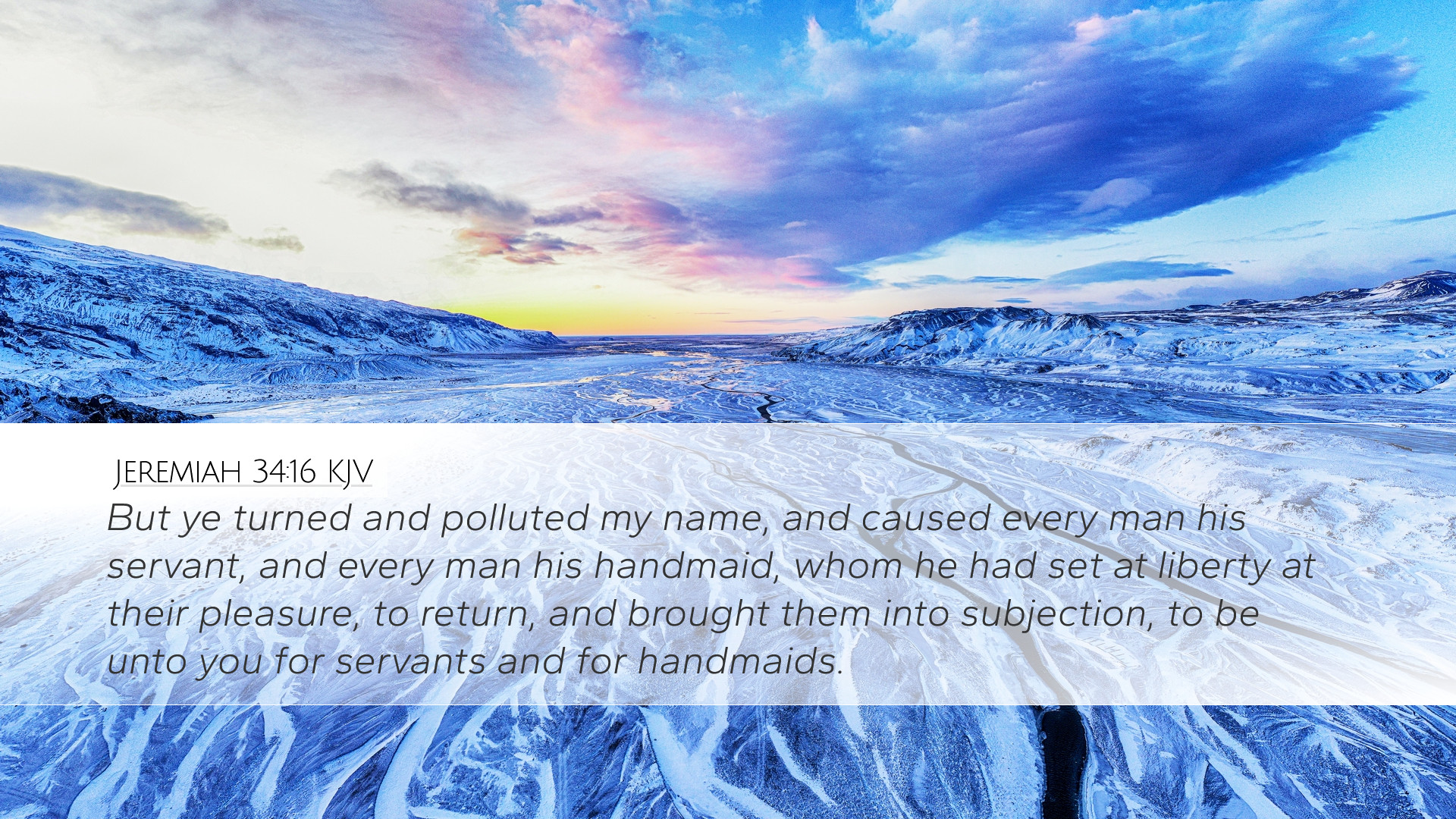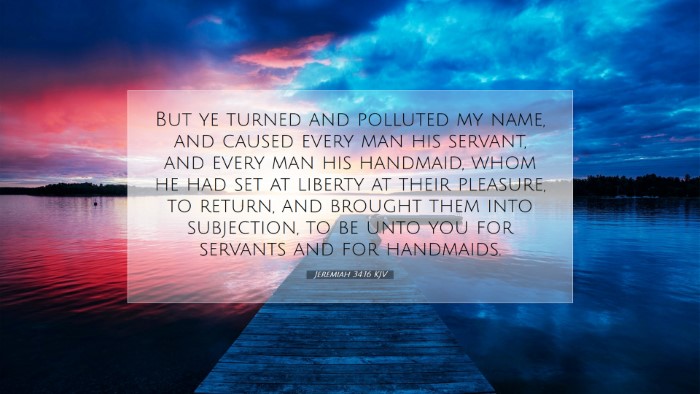Commentary on Jeremiah 34:16
Jeremiah 34:16 states: “But ye turned and polluted my name, and caused every man his servant, and every man his handmaid, whom he had set at liberty at their pleasure, to return, and brought them into subjection, to be unto you for servants and for handmaids.”
This verse encapsulates a significant moment in the historical and spiritual narrative of Israel as addressed by the prophet Jeremiah.
In this commentary, we will delve into the theological implications, historical context, and moral lessons drawn from this Scripture, synthesizing insights from various public domain sources.
Historical Context
The book of Jeremiah is set against the backdrop of the final days of Judah before its fall to Babylon.
The people of Judah had entered into a covenant with God, promising to adhere to His statutes.
However, during a time of distress and fear of foreign invasion, they sought to save themselves by disregarding their commitments.
This background is critically important for understanding the gravity of their actions and Jeremiah's prophetic admonition.
Theological Implications
In this verse, we observe profound insights into the nature of God's covenant with His people.
The act of returning to servitude after granting freedom denotes a breach of moral and religious duty, reflecting a deeper spiritual pollution that Jeremiah attributes to the people.
-
Moral Consequences of Rebellion:
As noted by Matthew Henry, the people's actions exemplified a willful rebellion against God's commandments.
By polluting God's name, they rejected the sanctity of their covenant, which was meant to uphold justice and humanity.
The image of servitude here highlights their failure to embrace the liberty offered by God.
-
God's Name in Jeopardy:
This phrase, “polluted my name,” suggests that their actions not only affected their standing before God but also marred His reputation among the nations.
Albert Barnes emphasizes that God’s name is intrinsic to His character; thus, disobedience cast a shadow on His holiness and reliability.
-
The Principle of Freedom and Servitude:
The freedom proclaimed by the people, then revoked, signifies a higher spiritual truth.
As Adam Clarke comments, true freedom comes from obedience to God; their rejection of freedom symbolizes a return to spiritual bondage, not only socially but theologically.
Reflection on Human Nature
This verse serves as an essential reflection on human nature and the tendency to revert to former ways, especially during trials.
Matthew Henry posits that humanity often seeks temporary comfort in familiar chains rather than trusting in God’s promises.
This observation leads to a deep understanding of the struggle for faith amidst trials and temptations.
Application for Today's Believers
For modern believers, Jeremiah 34:16 carries valuable lessons on fidelity and the importance of maintaining integrity in our walk with God.
The impatience of the Israelites mirrors the struggles faced by believers today.
The dangers of compromising one’s faith for immediate relief or societal pressures are profound and must be pondered deeply.
-
Covenantal Faithfulness:
Believers are called to remember their covenant with God, much like the Israelites were meant to.
This involves pursuing righteousness and peace, resisting the temptation to revert to former sins when faced with uncertainty.
-
Integrity in Witness:
The integrity of a believer’s witness is essential. Albert Barnes warns that how believers conduct themselves can reflect God’s character in the world.
Polluting one’s testimony through hypocrisy damages the ability to witness effectively to the grace of God.
-
Embracing True Freedom:
The call to radical obedience is paramount. Real freedom is found not in the absence of constraint but in the active following of God's law.
This principle speaks volumes not only to personal conduct but to the social structures believers are called to influence.
Conclusion
In conclusion, Jeremiah 34:16 serves as a solemn reminder of the consequences of turning away from God’s commands.
Through this verse, the implications of faithfulness and the importance of upholding the sanctity of God's name become increasingly clear.
Adam Clarke succinctly summarizes the importance of living in accordance with God’s declared will, for it is in obedience that one finds true liberty.


